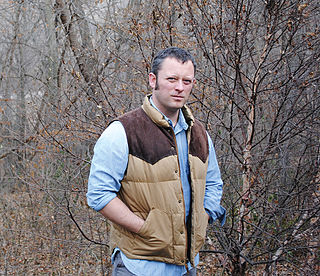A Quote by Kristin Gore
After writing for TV for a while, I got sort of fed up with all of the cancellations and the volatility in that industry. Also, you're always writing for someone else's character and story, and I really wanted to develop my own.
Related Quotes
Writing fiction lets you be a little more emotional and unguarded, a little freer. Writing fictional characters is also really different from writing about real people. In nonfiction, you can only say so much about the people you interact with. After all, they're actual people, their version of their story trumps yours. In a novel, you can build a character, using certain parts or impressions of someone you know, and guessing or inventing others, without having to worry that your guesses or memories or inventions are wrong.
I think my leap into TV and movies and comics is in a way natural because I'm a visual storyteller. If you look at any one of my short stories or novels, they sort of unscroll cinematically. Every scene is concrete in my mind. I can walk around the room and pick things up. I can describe at length every feature on the character, though I might only supply a glimpse of this on the page. So if I'm writing color into that I'm also writing texture, I'm pushing the image more than anything else.
I wanted to be a director first to protect my writing. I'm a playwright and you don't need to protect your writing when you're in the theater because everyone's there to protect the writing. When I had an idea for a film that I really cared about as my own, I wanted to direct it, and then I immediately became interested in directing in and of itself because it's such a deep art. You suddenly have all these tools at your disposal to tell the story.
Translation is harder, believe it or not. You do have to come up with a story, and actually I'm mystified by that process. I don't exactly know how the story just comes, but it does. But in writing a story that you're inventing, versus writing a story that somebody else has made up - there's a world of difference. In translation you have to get it right, you have to be precise in what you're doing.
Does character develop over time? In novels, of course it does: otherwise there wouldn't be much of a story. But in life? I sometimes wonder. Our attitudes and opinions change, we develop new habits and eccentricities; but that's something different, more like decoration. Perhaps character resembles intelligence, except that character peaks a little later: between twenty and thirty, say. And after that, we're just stuck with what we've got. We're on our own. If so, that would explain a lot of lives, wouldn't it? And also - if this isn't too grand a word - our tragedy.
To me, writing is much freer than dancing. With writing, you could do it whenever you wanted. You didn't have to do little exercises and stay in shape. You could have great moments of inspiration that advanced the story. In dance, unless you're going to choreograph things yourself, you're at the service of someone else.
When you are writing, you have to love all your characters. If you're writing something from a minor character's point of view, you really need to stop and say the purpose of this character isn't to be somebody's sidekick or to come in and put the horse in the stable. The purpose of this character is you're getting a little window into that character's life and that character's day. You have to write them as if they're not a minor character, because they do have their own things going on.
I always loved writing songs - writing for myself and demo-ing songs, really with no intention of ever letting anyone else hear them. Finally the Foo Fighters stuff happened when I just went to the studio down the street from my house and recorded some stuff in about five or six days, and all these people wanted to release it as an album. I wanted to release it on my own, with no photos and no names on it.
Writing two stories [in the Thorn and the Blossom] about the same set of events that were complete stories in themselves, but also added up to a larger story. As I was writing them, I kept going back and forth, because something would happen in one story that would have to be reflected in the other story. And yet the same event would also have to be perceived in different ways by Brendan and Evelyn, because they are different people with their own interpretations.



































